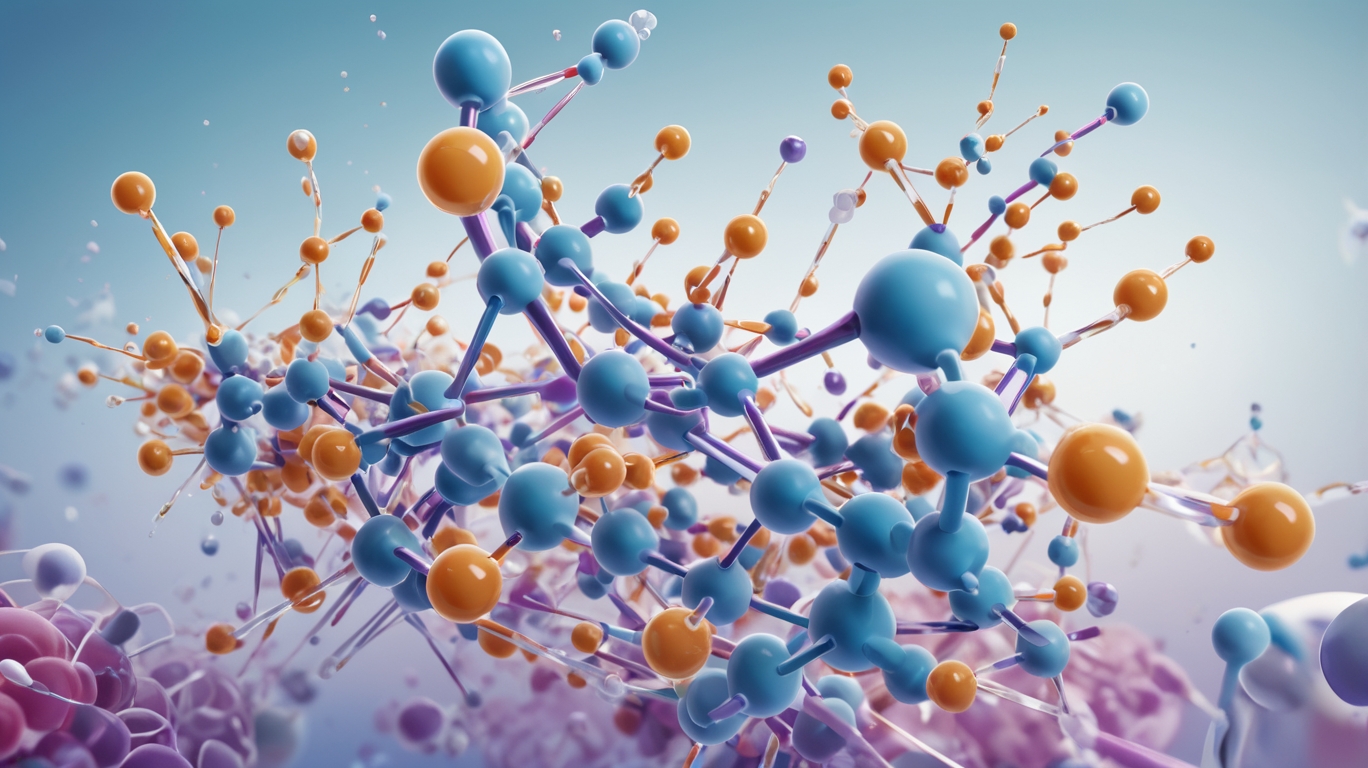If you’re curious about peptides and their role in health and fitness, you’re in the right spot. Whether you’re interested in muscle growth, anti-aging, or therapeutic applications, this guide will cover it all. Let’s dive into the fascinating world of peptides.
What are Peptides?
Peptides are short chains of amino acids, the building blocks of proteins. They’re like the unsung heroes in the world of biology, playing crucial roles in various bodily functions. From muscle growth peptides to anti-aging peptides, these tiny molecules are making waves in health and fitness.
Peptides are often used in peptide therapy to target specific health issues. They can be found naturally in the body or synthesized in labs. Fitness peptides, for instance, are popular among bodybuilders for their potential to enhance muscle growth and recovery. But it’s not just about bulking up; peptides for joint health and skin health are also gaining attention.
Here’s a quick look at some popular peptides:
| Peptide | Function |
|---|---|
| IGF-1 | Muscle growth and repair |
| GHRP | Stimulates growth hormone release |
| Thymosin Beta-4 | Wound healing and inflammation reduction |
| BPC-157 | Joint and gut health |
| CJC-1295 | Increases growth hormone levels |
Peptides are versatile, and their applications are vast. From peptides for immune support to those for cognitive enhancement, there’s a peptide for almost every need.
Mechanisms of Action

Peptides work by binding to specific receptors on cell surfaces, triggering various biological responses. This mechanism is what makes them so effective in targeted therapies. For instance, growth hormone-releasing peptides (GHRP) stimulate the pituitary gland to release growth hormone, aiding in muscle growth and recovery.
The beauty of peptides lies in their specificity. They can be designed to target particular pathways, making them ideal for precision medicine. Peptides for fat metabolism, for example, can help regulate energy balance and promote weight loss. Similarly, peptides for inflammation reduction can modulate immune responses, offering relief from chronic conditions.
Peptides like mod GRF 1-29 and ipamorelin are known for their ability to enhance hormone optimization. They work by mimicking natural hormones, providing a more balanced approach to therapy. This specificity reduces the risk of side effects, making peptides a safer alternative to traditional treatments.
Therapeutic Applications
The therapeutic potential of peptides is vast. From regenerative medicine to hormone optimization, peptides are being explored for a wide range of applications. Peptides for muscle repair and recovery are popular among athletes, while peptides for skin health are sought after for their anti-aging benefits.
Peptide therapy is also making strides in areas like wound healing and immune support. Thymosin beta-4 and BPC-157 are two peptides known for their ability to accelerate healing and reduce inflammation. These peptides are being studied for their potential in treating conditions like arthritis and inflammatory bowel disease.
In the realm of cognitive enhancement, nootropic peptides are gaining attention even buying online from reputable companies. These peptides are believed to improve brain function, memory, and focus. As research continues, the list of therapeutic applications for peptides is expected to grow, offering new hope for patients with various health concerns.
Challenges in Clinical Trials
Despite their potential, peptides face several challenges in clinical trials. One major hurdle is peptide stability. Peptides are prone to degradation, which can affect their efficacy. Researchers are working on developing stable peptide formulations to overcome this issue.
Another challenge is peptide delivery. Ensuring that peptides reach their target sites in the body is crucial for their effectiveness. Various peptide delivery systems are being explored, including peptide injections and oral formulations. However, achieving optimal peptide absorption remains a challenge.
Regulatory considerations also play a role in the clinical trial process. Peptides must meet stringent safety and efficacy standards before they can be approved for use. This can be a lengthy and costly process, but it’s essential to ensure that peptide therapies are safe for patients.
Regulatory Considerations
The regulatory landscape for peptides is complex. Peptides are classified as biologics, which means they must undergo rigorous testing to ensure their safety and efficacy. This includes peptide purity analysis and stability studies to confirm that the peptides meet quality standards.
Regulatory agencies like the FDA have specific guidelines for peptide therapies. These guidelines cover everything from peptide synthesis techniques to clinical trial protocols. Compliance with these regulations is crucial for the approval of peptide-based treatments.
One of the challenges in the regulatory process is the classification of peptides. Some peptides, like SARMs (Selective Androgen Receptor Modulators), are considered research chemicals and are subject to different regulations. This can create confusion for researchers and manufacturers, highlighting the need for clear regulatory frameworks.
Peptide Stability and Delivery
Peptide stability is a critical factor in their effectiveness. Peptides are susceptible to degradation, which can reduce their potency. Researchers are exploring various strategies to enhance peptide stability, including the use of protective coatings and modifications to the peptide structure.
Peptide delivery is another area of focus. Traditional delivery methods like peptide injections are effective but can be inconvenient for patients. Oral peptide formulations are being developed to improve patient compliance, but achieving adequate peptide absorption remains a challenge.
Innovative delivery systems, such as transdermal patches and nasal sprays, are also being explored. These methods offer the potential for more convenient and effective peptide delivery, expanding the possibilities for peptide therapy.
Advancements in Peptide Research
Peptide research is a rapidly evolving field. Advances in peptide synthesis techniques have made it possible to create custom peptide formulations tailored to specific needs. This has opened up new possibilities for peptide therapy, from hormone optimization to regenerative medicine.
Research chemical peptides are also being explored for their potential in various applications. These synthetic peptides offer the advantage of being highly specific and customizable, making them ideal for targeted therapies.
The development of bioactive peptides is another exciting area of research. These peptides have the ability to interact with biological systems in unique ways, offering new opportunities for therapeutic intervention. As research continues, the potential for peptides in medicine is expected to grow, paving the way for innovative treatments.
Safety and Efficacy
Safety and efficacy are paramount when it comes to peptide therapies. Peptides must undergo rigorous testing to ensure they are safe for use. This includes preclinical studies to assess their potential side effects and clinical trials to evaluate their effectiveness.
One of the advantages of peptides is their specificity. Because they can be designed to target specific pathways, they often have fewer side effects compared to traditional treatments. However, it’s important to note that not all peptides are created equal. The quality and purity of peptides can vary, so it’s crucial to source them from reputable research chemical suppliers.
Efficacy is another key consideration. Peptides must demonstrate their ability to produce the desired effects in clinical trials. This requires careful study design and robust data analysis to ensure that the results are reliable and meaningful.
Peptide Synthesis Techniques
Peptide synthesis is a complex process that involves the assembly of amino acid chains. There are several techniques used in peptide synthesis, each with its own advantages and limitations. Solid-phase peptide synthesis (SPPS) is one of the most common methods, known for its efficiency and ability to produce high-purity peptides.
Liquid-phase peptide synthesis is another technique, often used for longer peptides or those with complex structures. This method allows for greater flexibility in the synthesis process, but it can be more time-consuming and costly.
Advances in peptide synthesis technology have made it possible to create custom peptide formulations tailored to specific needs. This has opened up new possibilities for peptide therapy, from hormone optimization to regenerative medicine. As research continues, the potential for peptides in medicine is expected to grow, paving the way for innovative treatments.
Market Potential
The market potential for peptides is significant. With their wide range of applications, from fitness peptides to anti-aging peptides, the demand for peptide-based products is on the rise. Peptides for bodybuilding and muscle growth are particularly popular, as athletes and fitness enthusiasts seek ways to enhance their performance.
Peptides for skin health and anti-aging are also in high demand, as consumers look for effective solutions to maintain youthful skin. The growing interest in peptide supplementation for health and wellness is driving the market forward, with new products and formulations being developed to meet consumer needs.
As research continues to uncover new peptide benefits, the market is expected to expand further. The potential for peptides in medicine, from regenerative therapies to cognitive enhancement, offers exciting opportunities for growth and innovation in the industry.
Case Studies in Peptide Trials
Case studies in peptide trials provide valuable insights into the potential of peptide therapies. These studies often focus on specific peptides and their effects on various health conditions. For example, trials involving BPC-157 have shown promising results in promoting joint health and reducing inflammation.
Similarly, studies on CJC-1295 have demonstrated its ability to increase growth hormone levels, offering potential benefits for muscle growth and recovery. These case studies highlight the diverse applications of peptides and their potential to address a wide range of health concerns.
However, it’s important to note that not all peptide trials yield positive results. Some studies may encounter challenges related to peptide stability, delivery, or regulatory considerations. These challenges underscore the importance of rigorous research and development to ensure the safety and efficacy of peptide therapies.
Future Directions in Medicine
The future of peptides in medicine is bright. As research continues to advance, new peptide therapies are being developed to address a wide range of health concerns. From regenerative medicine to cognitive enhancement, peptides offer exciting possibilities for the future of healthcare.
One area of particular interest is the development of peptides for cellular repair and regeneration. These peptides have the potential to revolutionize the treatment of conditions like tissue damage and degenerative diseases. Similarly, peptides for metabolic enhancement and hormone optimization are being explored for their potential to improve overall health and well-being.
As the field of peptide research continues to evolve, the potential for innovative treatments and therapies is vast. With their unique mechanisms of action and wide range of applications, peptides are poised to play a significant role in the future of medicine.
Conclusion
Peptides are fascinating molecules with a wide range of applications in health and fitness. From muscle growth and anti-aging to therapeutic applications, peptides offer exciting possibilities for improving health and well-being. Despite the challenges in clinical trials and regulatory considerations, the potential for peptide therapies is significant. Advances in peptide synthesis techniques and delivery systems are paving the way for innovative treatments and therapies. As research continues to uncover new peptide benefits, the market for peptide-based products is expected to grow. Whether you’re interested in fitness peptides, health peptides, or peptide therapy, the future of peptides in medicine is bright. With their unique mechanisms of action and wide range of applications, peptides are poised to play a significant role in the future of healthcare.
Frequently Asked Questions
What are the benefits of peptide therapy?
Peptide therapy offers a range of benefits, from muscle growth and recovery to anti-aging and immune support. Peptides can be tailored to target specific health concerns, making them a versatile option for improving overall health and well-being.
Are peptides safe to use?
Peptides are generally considered safe when used appropriately. However, it’s important to source peptides from reputable suppliers and follow recommended dosages. Consulting with a healthcare professional can help ensure the safe and effective use of peptides.
How are peptides administered?
Peptides can be administered in various ways, including injections, oral formulations, and transdermal patches. The method of administration depends on the specific peptide and its intended use. Peptide injections are common for fitness and therapeutic applications, while oral formulations offer a more convenient option for daily use.
